Breathing is life’s first and last act — yet it’s one of the most overlooked miracles of existence. We inhale without thinking, yet every breath carries life, calmness, and even divine symbolism.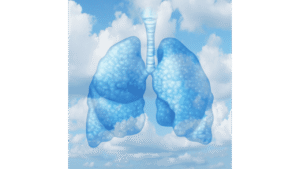
In the sacred teachings of Islam, air and breathing are not just biological functions; they are signs (آيات) from Allah. The Qur’an, Hadith, and Prophetic lifestyle reflect a deep respect for the breath — not only in worship but in daily life.
The Prophet Muhammad ﷺ emphasized natural habits that promote clean air, fresh breath, and healthy lungs — centuries before modern science understood their benefits. Today, research shows that these Sunnah practices improve respiratory health, emotional balance, and overall wellbeing. 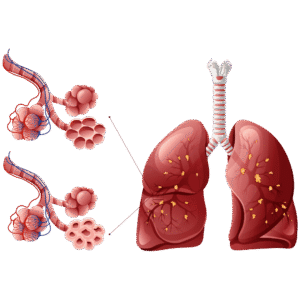
This article explores the importance of air and breathing in Islam, uncovering 7 powerful prophetic habits that enhance not just spiritual connection, but also natural lung health.
Air and Breath in the Qur’an: Divine Origins
In the Qur’an, the act of breathing is more than a physical process — it is a **divine signature of life**. The very essence of life begins when Allah instills the Rūḥ (رُوح) — the soul or breath — into the human being.
﴿ فَإِذَا سَوَّيْتُهُ وَنَفَخْتُ فِيهِ مِن رُّوحِي فَقَعُوا لَهُ سَاجِدِينَ ﴾
“So when I have fashioned him and breathed into him of My spirit, then fall down before him in prostration.”
— Surah Al-Ḥijr (15:29)
This verse marks a divine moment where biology meets spirituality. Allah’s act of *breathing into Adam* signifies that human life begins with the breath of the Creator — establishing the sacredness of breath in Islam.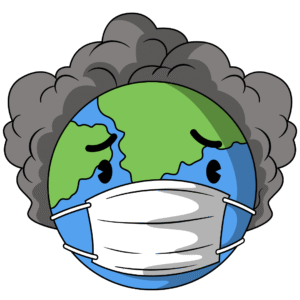
The Qur’an also reminds us that wind (الريح) and air are among the signs (آيات) of Allah, demonstrating His mercy, power, and control over nature:
﴿ وَهُوَ ٱلَّذِى يُرْسِلُ ٱلرِّيَـٰحَ بُشْرًۭا بَيْنَ يَدَىْ رَحْمَتِهِۦ ۖ ﴾
“And it is He who sends the winds as good tidings before His mercy.”
— Surah Al-A‘rāf (7:57)
In this verse, the **wind is described as a messenger of mercy**, preceding rainfall — vital for life. From the **spiritual breath of the soul** to the **winds that bring physical sustenance**, air and breathing in Islam are presented as direct gifts from Allah ﷻ.
Islamic scholars, such as Imam Al-Qurtubi and Ibn Kathir, interpret these verses as proofs that the air we breathe is a sign of divine care and creation. Without it, life cannot be sustained, and with it, we are continuously reminded of Allah’s This is the concepts about air and breathing in islam.
🔍 Tafsir Reflections: Breath in the Qur’an
1. Tafsir of Surah Al-Hijr (15:29)
﴿ وَنَفَخْتُ فِيهِ مِن رُّوحِي ﴾ — “And I breathed into him of My spirit.”
Ibn Kathir explains that this breath is a direct honor from Allah to Adam (AS), showing the divine origin of human life. It implies that breath is not merely physical, but a sign of Allah’s mercy and power.
Al-Qurtubi adds: “This ‘Ruh’ is not Allah’s literal spirit but a created soul, honored by association with Him — emphasizing the nobility of human life.”
2. Tafsir of Surah Al-A‘rāf (7:57)
﴿ وَهُوَ ٱلَّذِى يُرْسِلُ ٱلرِّيَـٰحَ بُشْرًۭا بَيْنَ يَدَىْ رَحْمَتِهِۦ ﴾ — “And it is He who sends the winds as good tidings before His mercy.”
Ibn Kathir mentions that the wind here is described as a herald of divine mercy, bringing rain — essential for life. This shows how air and weather systems are part of Allah’s care for His creation.
Al-Razi highlights the metaphorical meaning — the winds that bring life also symbolize the unseen workings of Allah in the world, connecting air to both **physical** and **spiritual vitality**.
Hadiths on Breathing and Air Etiquette
The Prophet Muhammad ﷺ taught us that even the **simple act of breathing** carries spiritual and hygienic significance. His habits reflect a deep understanding of personal and public health — centuries before modern science confirmed their value.
1. Pausing Between Breaths While Drinking
عَنْ أَنَسٍ قَالَ: كَانَ رَسُولُ اللَّهِ ﷺ يَتَنَفَّسُ فِي الشَّرَابِ ثَلَاثًا
“Anas (RA) reported: The Messenger of Allah ﷺ used to breathe three times in the course of a drink.”
— Sahih Muslim 2028
This Sunnah practice of pausing between sips is now known to prevent choking, allow proper digestion, and reduce air intake that causes bloating.
2. Covering Mouth While Yawning or Sneezing
إِذَا تَثَاءَبَ أَحَدُكُمْ فَلْيُمْسِكْ بِيَدِهِ عَلَى فِيهِ
“When one of you yawns, he should cover his mouth with his hand.”
— Sahih Muslim 2995
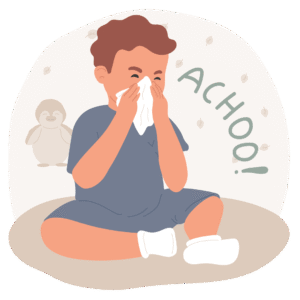 This prophetic teaching aligns directly with modern infection control practices, where **covering the mouth** is essential to prevent the spread of airborne germs. This is the importance of clean air in hadith.
This prophetic teaching aligns directly with modern infection control practices, where **covering the mouth** is essential to prevent the spread of airborne germs. This is the importance of clean air in hadith.
3. Using Miswak for Breath and Oral Hygiene
لَوْلَا أَنْ أَشُقَّ عَلَى أُمَّتِي لَأَمَرْتُهُم بِالسِّوَاكِ عِنْدَ كُلِّ صَلَاةٍ
“Had I not feared burdening my Ummah, I would have commanded them to use the miswak before every prayer.”
— Sahih al-Bukhari 887
The miswak not only freshens breath but has been proven by modern research to kill harmful oral bacteria, reduce plaque, and improve air quality in the mouth.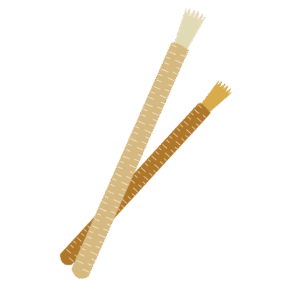
These teachings highlight how air and breathing in Islam are preserved through everyday acts — from how we drink, yawn, or pray. They serve both spiritual mindfulness and scientific wisdom.
🔍 Tafsir & Sharh (Commentary): Hadith on Breathing Etiquette
1. Pausing While Drinking – Sahih Muslim 2028
Imam Al-Nawawi in *Sharh Sahih Muslim* explains:
“The Prophet ﷺ’s pauses between sips are signs of moderation, thankfulness, and protection from harm. He drank calmly and gracefully, teaching hygiene and manners.”
2. Covering the Mouth When Yawning – Sahih Muslim 2995
Ibn Hajar al-Asqalani in *Fath al-Bari* writes:
“Yawning is disliked because it is from the Shaytan, and open yawning leads to harm — spiritually and physically. Covering the mouth is both spiritual protection and public hygiene.”
3. Miswak Before Prayer – Sahih al-Bukhari 887
Imam Al-Qurtubi in *Tafsir al-Qurtubi* (on 74:4):
“Miswak purifies not just the mouth, but prepares one for prayer — body and soul — so that their breath and presence are clean before Allah.”
Why Lung Health Matters in Today’s World
Our lungs — the engines of breath — are under constant threat in the modern world. From polluted air to lifestyle habits, we are increasingly exposed to invisible risks that damage our breathing system.
According to the World Health Organization (WHO), over 300 million people worldwide suffer from asthma, and chronic respiratory diseases like COPD and lung cancer are on the rise. Air pollution alone causes over 7 million premature deaths every year.
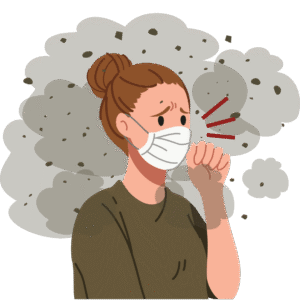 Fine particulate matter (PM2.5) — mostly from vehicles, industrial emissions, and burning — enters the lungs and even the bloodstream, leading to inflammation, cancer, heart disease, and reduced immunity.
Fine particulate matter (PM2.5) — mostly from vehicles, industrial emissions, and burning — enters the lungs and even the bloodstream, leading to inflammation, cancer, heart disease, and reduced immunity.
Islam encourages us to reflect on such harms and take precautions. The Qur’an says:
﴿ وَلَا تُلْقُوا بِأَيْدِيكُمْ إِلَى التَّهْلُكَةِ ﴾
“Do not throw yourselves into destruction with your own hands.”
— Surah Al-Baqarah (2:195)
Polluting the air we breathe or neglecting our lung health is a form of passive self-harm. The solution? Return to simple Prophetic practices that nurture the body, protect our lungs, and honor the gift of breath.In this way We can explain the air pollution in islam.
In the next section, we’ll explore 7 powerful prophetic habits and respiratory health from sunnah that serve as natural, holistic preventive measures for modern respiratory challenges.
7 Prophetic Habits and Respiratory Health Improvement Naturally
Long before modern science uncovered the dangers of poor air quality and shallow breathing, the Prophet Muhammad ﷺ taught practices that naturally protect and strengthen our lungs. Here are 7 habits</strong from the Sunnah that promote respiratory wellness and overall vitality. In this way we can Converge the lung health and Sunnah,Prophetic habits and respiratory health.
1. Sleeping on the Right Side — Improves Lung Drainage
The Prophet ﷺ said:
كَانَ يَتَوَجَّهُ فِي نَوْمِهِ إِلَى يَمِينِهِ
“He ﷺ used to sleep on his right side.”
— Sahih al-Bukhari 247
 Modern research confirms that right-side sleeping enhances lymphatic drainage and supports optimal lung expansion, especially for those with respiratory issues.
Modern research confirms that right-side sleeping enhances lymphatic drainage and supports optimal lung expansion, especially for those with respiratory issues.
2. Using Miswak Regularly — Promotes Airway Hygiene
The Prophet ﷺ said:
لَوْلَا أَنْ أَشُقَّ عَلَى أُمَّتِي لَأَمَرْتُهُمْ بِالسِّوَاكِ عِنْدَ كُلِّ صَلَاةٍ
“Had I not feared burdening my ummah, I would have ordered the use of miswak before every prayer.”
— Sahih al-Bukhari 887
The World Health Organization endorses miswak as an effective natural toothbrush that reduces oral pathogens, freshens breath, and indirectly improves airway cleanliness.
3. Controlled Breathing in Salah & Dhikr — Boosts Lung Capacity
During prayer and dhikr, Muslims breathe with rhythmic flow and focus. This mirrors modern techniques of diaphragmatic breathing and mindfulness, known to increase lung elasticity and reduce anxiety.
Tafsir Insight: In Surah Al-Mu’minun (23:1-2), Allah says:
قَدْ أَفْلَحَ الْمُؤْمِنُونَ ﴿١﴾ الَّذِينَ هُمْ فِي صَلَاتِهِمْ خَاشِعُونَ ﴿٢﴾
“Successful indeed are the believers — those who have humility in their prayer.”
4. Avoiding Harmful Smells & Smoke — Protects Respiratory Health
The Prophet ﷺ discouraged harmful odors and prohibited anyone who had eaten garlic or onions from attending the mosque:
مَنْ أَكَلَ مِنْ هَذِهِ الشَّجَرَةِ فَلَا يَقْرَبَنَّ مَسْجِدَنَا
“Whoever eats from this plant (garlic), let him not come near our mosque.”
— Sahih Muslim 564
This indicates an early awareness of airborne irritants and sets a foundation for anti-smoking, anti-pollution etiquette.
5. Maintaining a Clean, Ventilated Environment
The Prophet ﷺ said:
الطُّهُورُ شَطْرُ الْإِيمَانِ
“Cleanliness is half of faith.”
— Sahih Muslim 223
He encouraged ventilation and airing out homes — a practice that reduces indoor pollutants and improves air circulation, vital for lung function.
6. Covering Mouth When Sneezing or Yawning — Prevents Pathogen Spread
The Prophet ﷺ taught:
إِذَا تَثَاءَبَ أَحَدُكُمْ فَلْيَضَعْ يَدَهُ عَلَى فِيهِ
“When one of you yawns, he should place his hand over his mouth.”
— Sahih Muslim 2995
This is now standard in modern infection control guidelines to prevent the airborne spread of respiratory viruses.
7. Conscious Breath Control in Tajweed — Trains the Lungs
Reciting Qur’an with proper Tajweed involves precise breath control and sound articulation.
Imam Al-Jazari in his famous poem said:
“وَلَيْسَ بَيْنَهُ وَبَيْنَ تَارِكِهِ إِلَّا رِيَاضَةُ امْرِئٍ بِفَمِهِ”
“There’s nothing between one who learns Tajweed and one who doesn’t, except breath control and discipline.”
Such practice trains lung stamina and mental focus, making Tajweed a spiritual and respiratory exercise. This are the prophetic habits and respiratory health improvement Concepts.
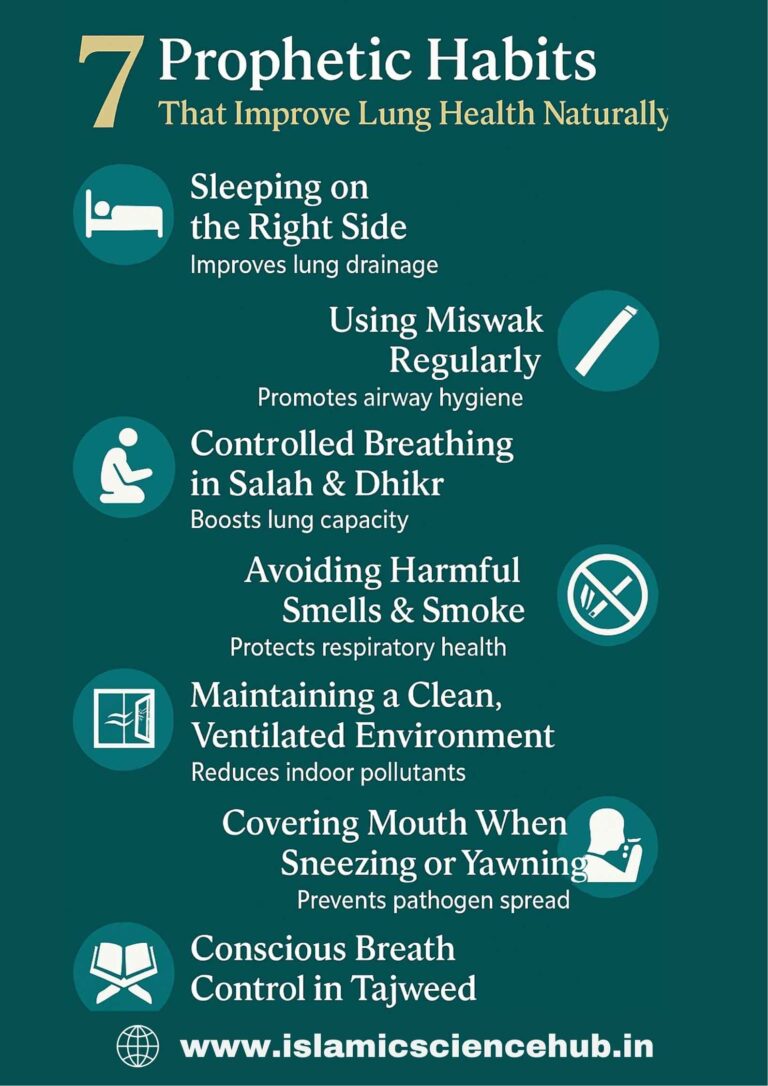
Clean Air as an Islamic Environmental Responsibility
In Islam, the environment is a trust (amānah) from Allah ﷻ — and the air we breathe is part of this divine gift. Polluting it is not only a health hazard, but a violation of Islamic ethics.This is what Islam says about air pollution in islam.
لَا ضَرَرَ وَلَا ضِرَارَ
“There should be neither harming nor reciprocating harm.”
— Hadith, Sunan Ibn Mājah 2340; authenticated by Al-Nawawi and Ibn Hajar
This powerful hadith forms the **legal maxim** of Islamic environmental ethics. Causing harm through air pollution, toxic fumes, or smoking clearly contradicts this Prophetic principle.
🌿 Planting Trees: A Prophetic Legacy
إِذَا قَامَتِ السَّاعَةُ وَفِي يَدِ أَحَدِكُمْ فَسِيلَةٌ فَلْيَغْرِسْهَا
“If the Final Hour comes while you have a sapling in your hand — plant it.”
— Musnad Ahmad 12902
This shows that **planting trees** — which purify air and reduce CO₂ — is a form of ongoing sadaqah and reflects true Islamic responsibility.
🚫 Avoiding Smoke: Protecting Others
Just as second-hand smoke harms bystanders, industrial smoke, burning plastic, and car emissions harm others in subtle but deadly ways. The Prophet ﷺ said:
مَنْ ضَارَّ ضَارَّ اللَّهُ بِهِ
“Whoever causes harm, Allah will harm him.”
— Sunan Abu Dawud 3635
Being aware of our impact on the air around us is not a luxury — it is a religious duty. Clean air = healthy body + rewarded soul.
Science Supports the Sunnah
Islamic teachings are not only spiritually enriching — they are biologically sound. Prophetic habits related to air, breathing, and hygiene have been scientifically validated in recent decades, showing how the Sunnah promotes both faith and physical health.
🫁 Deep Breathing Reduces Stress and Strengthens Lungs
Studies published in journals like Frontiers in Psychology and Harvard Health show that deep, diaphragmatic breathing significantly reduces cortisol (stress hormone), lowers blood pressure, and improves lung volume.
This aligns with Salah (prayer) and Dhikr (remembrance), where Muslims engage in slow, controlled breathing multiple times a day.
🪥 Miswak: A Natural Antibacterial Wonder
Research by the World Health Organization (WHO) and dental journals confirms that miswak contains antibacterial compounds like salvadorine and silica, which kill plaque-forming bacteria and freshen breath naturally.
In many cases, it performs better than synthetic toothbrushes — proving the wisdom of the Prophet ﷺ in recommending it 1400+ years ago.
📏 Good Posture & Clean Air = Lung Longevity
Medical studies emphasize that sleeping on the right side enhances drainage of the lymphatic system, improves heart function, and reduces acid reflux — which supports easier breathing at night.
Meanwhile, living in well-ventilated, clean spaces dramatically reduces the risk of chronic lung conditions, especially asthma and bronchitis.
الطُّهُورُ شَطْرُ الْإِيمَانِ
“Cleanliness is half of faith.”
— Sahih Muslim 223
It is now clear from prophetic habits and respiratory health: the Sunnah isn’t just a tradition — it’s a prescription for healthier living.
Actionable Tips to Start Today
The teachings of the Prophet ﷺ offer practical habits that not only improve physical health but also bring spiritual rewards. Implementing these simple steps can benefit your lungs, mind, and soul.Now Extract from prophetic habits and respiratory health and air and breathing in islam..
- 🌙Begin Dhikr with Deep Breathing: Start your morning or evening dhikr sessions by focusing on your breath. This connects your mind and body, bringing peace and enhancing your lung health.
- 🌿Open Windows for Fresh Air: Follow the Sunnah of airing your home daily. Let fresh air circulate through your home to purify the environment and improve breathing quality.
- 🪥Carry a Miswak: Keep a miswak with you, just as the Prophet ﷺ recommended. Using it before prayer not only enhances oral hygiene but purifies the air in your body.
- 🛏️Practice Proper Sleep Posture: Sleep on your right side, as taught by the Prophet ﷺ. This improves lung drainage and promotes overall respiratory health.
- 🤲Cover Your Mouth: When sneezing or yawning, follow the Sunnah by covering your mouth, preventing the spread of germs and showing respect for others’ health.
- 🌱Plant Trees: Take a moment to plant trees, as the Prophet ﷺ encouraged. It is a continuous charity (sadaqah jariyah) and purifies the air for others.
- 📖Practice Tajweed with Focused Breathing: Recite Qur’an with the correct Tajweed, focusing on your breath. This improves your lung capacity and clears your mind.
Take small steps every day, and each action will benefit you both physically and spiritually.In this way we can improve both lung health and sunnah practice.
Conclusion: Breathe as the Prophet ﷺ Taught
Breathing is not just biological — it’s sacred. From the moment we are born until our final breath, air sustains life. And through the Sunnah, Islam teaches us how to breathe with mindfulness, purity, and intention.
Whether it’s using miswak, sleeping on the right side, or simply pausing to breathe during dhikr — each act holds health benefits and carries spiritual significance.
وَنَفَخْتُ فِيهِ مِن رُّوحِي
“And I breathed into him of My spirit…”
— Surah Al-Hijr (15:29)
This divine breath — the Rūḥ — is what gives us life. By honoring it through Prophetic habits, we not only care for our lungs, but also our soul.
Let this be your call to action: Start small. Pick one Sunnah breathing habit and apply it today — for a healthier body and a cleaner soul.
Your breath is a gift from Allah ﷻ. Use it wisely. Use it Sunnah-style.
Frequently Asked Questions About Air and Breathing in Islam
🌬️ What does Islam say about breathing and air?
Islam views breath as a divine sign. In Surah Al-Hijr (15:29), Allah ﷻ says:
“And I breathed into him of My spirit…” — reflecting the sacred nature of air and life. Breathing is both a physical and spiritual act in Islam.
🫁 How can Sunnah improve lung health?
Prophetic habits like sleeping on the right side, practicing dhikr with controlled breathing, and avoiding harmful smells naturally support lung function and emotional well-being. These align closely with modern respiratory science. In this way we improve both lung health and sunnah practice.
🪥 Is miswak better than modern tools for oral hygiene?
Studies by the World Health Organization and dental researchers confirm that miswak has natural antibacterial properties, reducing plaque and improving breath. It’s a Sunnah with verified health benefits.
🌱 Does Islam address air pollution and cleanliness?
Yes. The Prophet ﷺ emphasized cleanliness and not harming others. He said:
“Do not cause harm or reciprocate harm.” (Hadith: La darar wa la dirar). Islam promotes planting trees, maintaining clean air, and caring for the Earth.this is air pollution in islam.
References and Source Links
This article integrates authentic Islamic teachings with peer-reviewed scientific research. Below are the references cited throughout this post:
- Qur’anic Verses:
Surah Al-Hijr (15:29) – “And I breathed into him of My Spirit.” - Prophetic Teachings:
Sunan Ibn Majah 3502 – On covering the mouth while yawning or sneezing. - Use of Miswak:
Sahih Bukhari 888 – The Prophet ﷺ said: “Were it not for my ummah, I would have ordered them to use the miswak for every prayer.” - WHO on Miswak:
WHO Oral Health Report – Traditional tools like miswak offer clinical benefits. - PubMed on Posture & Breathing:
Posture’s effect on lung function – NIH research on sleep position and respiratory health. - Environmental Responsibility in Islam:
Environmentalism in Islam – AA News - Islam and Public Health:
Islamic Health Ethics in Practice – Published via PMC (NCBI).


